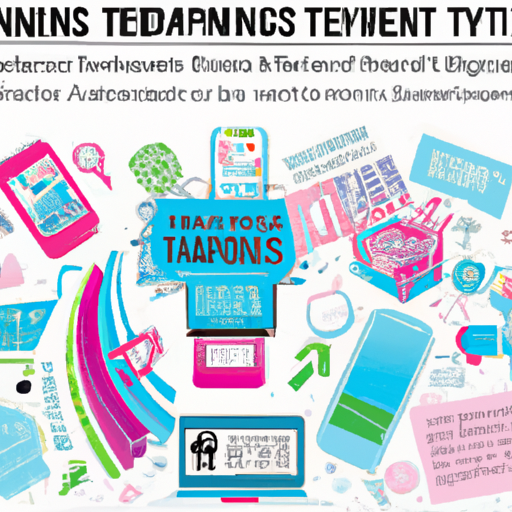Event Industry Trends
In this article, you will explore the latest trends in the event industry. From technological advancements to experiential marketing, this piece will take you on a journey through the exciting and ever-evolving world of events. Discover how virtual reality is reshaping the way we experience events, witness the rise of sustainability practices, and uncover the power of personalized and immersive experiences. Get ready to be inspired and informed as we delve into the captivating realm of event industry trends.

Table of Contents
1. Virtual and Hybrid Events
Virtual and hybrid events have become increasingly popular in recent years, driven in part by advancements in technology and the changing needs and preferences of event attendees.
1.1 Increased demand for virtual events
The COVID-19 pandemic had a significant impact on the event industry, forcing many companies and organizations to transition their in-person events to virtual platforms. This sudden shift gave rise to a surge in demand for virtual events, as they offered a safe alternative for people to connect and engage while adhering to social distancing guidelines. Virtual events also allowed for a wider reach, as participants could join from anywhere in the world without the need for travel.
1.2 Hybrid events on the rise
In response to the challenges posed by the pandemic, many event organizers have adopted a hybrid approach, combining the best of both virtual and in-person experiences. Hybrid events offer the flexibility to cater to a diverse audience, with some attendees participating in-person while others join virtually. This allows for increased attendance and engagement, as individuals who may not be able to physically attend can still be a part of the event.
1.3 New technologies enhancing virtual and hybrid events
The evolution of technology has played a crucial role in enhancing the virtual and hybrid event experience. With the availability of high-quality video conferencing platforms, interactive virtual platforms, and live streaming capabilities, event organizers can create immersive and engaging experiences for attendees. Technologies such as virtual reality (VR) and augmented reality (AR) have also been integrated into events, offering unique and interactive elements that leave a lasting impression on participants.
2. Sustainability and Eco-friendly Practices
In recent years, there has been a growing focus on sustainability within the event industry. Event organizers are recognizing the importance of incorporating eco-friendly practices to minimize their environmental impact.
2.1 Growing focus on sustainability in the event industry
There has been a significant shift towards sustainability in the event industry, driven by both consumer demand and environmental concerns. Attendees are increasingly conscious of the environmental footprint of events they participate in, and they expect organizers to prioritize sustainability. This has led to a greater emphasis on reducing waste, conserving energy, and promoting sustainable practices throughout the event planning process.
2.2 Incorporation of eco-friendly practices
Event organizers are actively implementing eco-friendly practices to make their events more sustainable. This includes measures such as reducing single-use plastics, implementing recycling programs, using eco-friendly materials for event signage and branded merchandise, and incorporating sustainable catering options. By making these conscious choices, event organizers can contribute to a more sustainable future while also aligning with the values and expectations of attendees.
2.3 Use of renewable energy sources
In addition to adopting eco-friendly practices, event organizers are increasingly turning to renewable energy sources to power their events. Solar panels, wind turbines, and other renewable energy technologies are being utilized to reduce reliance on fossil fuels and minimize the carbon footprint of events. The use of renewable energy not only demonstrates a commitment to sustainability but also serves as a visible example for attendees, inspiring them to adopt similar practices in their own lives.
3. Personalization and Customization
As attendees seek more meaningful and relevant experiences, event organizers are shifting towards personalization and customization to meet their expectations.
3.1 Shift towards personalized event experiences
Gone are the days of one-size-fits-all events. Attendees now expect events to cater to their individual preferences and interests. Event organizers are embracing this shift by leveraging data and technology to personalize the event experience. This includes tailoring event content, sessions, and networking opportunities based on attendee profiles and preferences.
3.2 Customizing event content and formats
Personalization extends beyond attendee profiles. Event organizers are also customizing event content and formats to create a more engaging and interactive experience. This may involve incorporating interactive workshops, panel discussions, and Q&A sessions to encourage attendee participation. By offering a variety of options and formats, event organizers can ensure that attendees can create their personalized event journey that aligns with their goals and interests.
3.3 Leveraging data for personalized marketing
Data plays a crucial role in personalizing the event experience. Event organizers can gather valuable insights through registration data, attendee surveys, and social media engagement, which can then be used to create targeted marketing campaigns. By understanding attendees’ preferences, event organizers can send personalized invitations, recommend relevant sessions, and provide tailored event updates, ultimately enhancing attendee engagement and satisfaction.

4. Safety and Security Measures
Ensuring the safety and security of attendees has always been a top priority for event organizers. In recent times, the focus on safety measures has intensified, particularly in light of the ongoing COVID-19 pandemic.
4.1 Implementation of enhanced security protocols
Event organizers are implementing enhanced security protocols to mitigate potential risks and protect attendees. This includes measures such as increased security personnel, comprehensive security checks, and the use of surveillance technology to monitor and respond to any security threats. These measures help create a safe environment for attendees and provide peace of mind.
4.2 Integration of health and safety measures
The COVID-19 pandemic has necessitated the integration of specific health and safety measures into event planning and execution. This includes conducting health screenings, implementing social distancing protocols, providing sanitization stations, and requiring the use of face masks. Event organizers work closely with health authorities and follow guidelines to ensure the well-being of attendees. The successful implementation of these measures instills confidence in attendees and demonstrates a commitment to their health and safety.
4.3 Use of contactless technologies
To minimize person-to-person contact, event organizers are increasingly adopting contactless technologies. This includes contactless registration processes, digital ticketing, and cashless payment options. By reducing physical touchpoints and implementing seamless contactless solutions, event organizers can enhance attendee comfort and create a safer environment for everyone.
5. Importance of Emotional Connection
In an increasingly digital world, creating emotional connections with attendees has become paramount for event organizers. Emotional connections help in building long-lasting relationships and fostering loyalty among attendees.
5.1 Building emotional connections with attendees
Event organizers are recognizing the importance of connecting with attendees on an emotional level. This involves understanding attendees’ needs, aspirations, and challenges, and designing event experiences that resonate with them. By eliciting emotions such as joy, inspiration, and belonging, event organizers can create a memorable and impactful experience that leaves a lasting impression.
5.2 Emphasis on immersive and memorable experiences
To evoke emotions and create an immersive experience, event organizers are incorporating various elements such as interactive displays, captivating visuals, and engaging performances. This could include live entertainment, artistic installations, or unique experiential activations that stimulate the senses and create a sense of wonder. By creating memorable moments, event organizers can forge a stronger emotional connection with attendees.
5.3 Leveraging storytelling and sensory elements
Storytelling has proven to be a powerful tool in connecting with audiences on an emotional level. Event organizers are leveraging storytelling techniques to craft narratives that resonate with attendees, incorporating elements of suspense, humor, and personal anecdotes. Alongside storytelling, sensory elements such as music, lighting, and aromas are being used to evoke specific emotions and create a multi-sensory experience that immerses attendees in the event.
6. Integration of Artificial Intelligence
Artificial intelligence (AI) is revolutionizing the event industry, providing event organizers with powerful tools to enhance attendee experiences, streamline operations, and gather valuable insights.
6.1 AI-powered chatbots for attendee assistance
AI-powered chatbots have gained popularity in the event industry as a means of providing instant assistance to attendees. These chatbots can answer common questions, provide event information, and guide attendees through registration processes. By automating these interactions, event organizers can free up staff resources and provide efficient and personalized support to attendees.
6.2 Predictive analytics for event planning
AI-driven predictive analytics is transforming event planning by providing event organizers with valuable insights into attendee behavior and preferences. By analyzing data from past events and external sources, AI algorithms can make predictions and recommendations, such as the optimal event location, session scheduling, and targeted marketing strategies. This data-driven approach helps event organizers make informed decisions and optimize the event experience based on attendee expectations.
6.3 AI-driven data analysis and insights
AI technologies can analyze vast amounts of data collected during events, extracting meaningful insights and trends that can inform future event planning. By understanding attendee preferences, engagement patterns, and feedback, event organizers can continuously improve and tailor their events to meet attendee expectations. The integration of AI-driven data analysis also enables real-time reporting and monitoring, allowing event organizers to make timely adjustments and ensure the success of their events.
7. Rise of Experiential Marketing
Experiential marketing has become a powerful tool for brands to engage with their target audience and create memorable brand experiences. Event organizers are embracing this trend by incorporating interactive and immersive brand activations into their events.
7.1 Shifting focus towards experiential marketing
Traditional marketing methods are losing their effectiveness as consumers become more discerning and demand more meaningful interactions. Experiential marketing allows brands to connect with their audience on a deeper level by providing unique and immersive experiences that showcase their products or services. Event organizers are partnering with brands to create interactive activations that enable attendees to interact with the brand and form a genuine connection.
7.2 Interactive and immersive brand activations
Event organizers are designing interactive and immersive brand activations that captivate attendees’ attention and create an unforgettable experience. This could include virtual reality experiences, interactive demos, product showcases, or immersive installations that allow attendees to explore and engage with the brand. By immersing attendees in the brand’s story and values, event organizers can leave a lasting impression and foster brand loyalty.
7.3 Utilizing gamification and virtual reality
Gamification and virtual reality (VR) are powerful tools used by event organizers to create interactive and engaging experiences. Gamification elements, such as challenges, competitions, and rewards, add an element of fun and excitement to events, encouraging active participation from attendees. Virtual reality experiences, on the other hand, transport attendees to a virtual world where they can explore, learn, and interact with the brand in a completely immersive way. By incorporating these technologies, event organizers can differentiate their events and deliver a truly memorable experience for attendees.
8. Embrace of Micro Events
As event preferences evolve, there has been a noticeable trend towards smaller and more intimate gatherings known as micro events.
8.1 Trend towards smaller and intimate events
Micro events have gained popularity as attendees seek more personalized and exclusive experiences. These events typically have a limited number of attendees, allowing for more meaningful interactions and connections. Examples of micro events include intimate workshops, executive retreats, or specialized networking events focused on specific industries or interests.
8.2 Benefits of micro events in creating meaningful connections
One of the key benefits of micro events is the opportunity to create deeper and more meaningful connections among attendees. With smaller attendee numbers, participants can engage in more in-depth conversations, exchange ideas, and build genuine relationships. Micro events also provide a more focused and tailored experience, allowing attendees to receive personalized attention and access to industry experts or thought leaders.
8.3 Popularity of micro-weddings and micro-conferences
Micro events have gained particular popularity in the wedding industry, with couples opting for smaller, intimate ceremonies and receptions. These micro-weddings allow couples to focus on creating a memorable experience for a select group of loved ones, rather than accommodating a large number of guests. Similarly, micro-conferences have become a preferred format for industries that require niche expertise or specialized knowledge. These events offer a highly targeted and immersive learning experience for attendees.
9. Integration of Live Streaming
The importance of live streaming in events has grown significantly in recent years, enabling event organizers to extend their reach and engage with a wider audience.
9.1 Growing importance of live streaming in events
Live streaming allows event organizers to broadcast their events in real-time, reaching individuals who are unable to attend in person. This could be due to geographical constraints, scheduling conflicts, or capacity limitations. By offering a live streaming option, event organizers can expand their audience and make their content accessible to a global audience.
9.2 Hybrid events incorporating live streaming
With the rise of hybrid events, live streaming has become an integral component of the event experience. By streaming the in-person sessions and activities, virtual attendees can participate in real-time, ask questions, and engage with the content. This integration of live streaming bridges the gap between virtual and in-person experiences, creating a seamless and inclusive event environment.
9.3 Enhanced reach and engagement through live streaming
Live streaming provides event organizers with the opportunity to engage with a larger audience, extending the reach of their content and increasing attendee engagement. By incorporating interactive features such as live chats, polls, and Q&A sessions, virtual attendees can actively participate and contribute to the event experience. This real-time interaction fosters a sense of community and helps create a more engaging and immersive event experience for all participants.
10. Expansion of Event Tech Solutions
Advancements in event technology have revolutionized the event planning and execution process, empowering event organizers to streamline operations and deliver exceptional experiences.
10.1 Advancements in event technology
The event tech landscape has seen significant advancements in recent years, with new solutions emerging to address the evolving needs of event organizers. From event management platforms and attendee registration systems to virtual event platforms and networking apps, the range of event tech solutions available is vast. These technologies help automate manual tasks, enhance attendee experiences, and provide organizers with valuable insights into event performance.
10.2 Integrating event management platforms
Event management platforms have become essential tools for event organizers, consolidating various aspects of event planning and execution into a centralized system. These platforms enable event organizers to manage registration and ticketing, create personalized event agendas, send targeted communications, and track attendee engagement. By integrating event management platforms, organizers can streamline their workflows, reduce manual errors, and provide attendees with a seamless registration and event experience.
10.3 Streamlining event planning and execution
Event tech solutions are streamlining the event planning and execution process, making it more efficient and cost-effective. From event mobile apps that provide real-time updates and personalized agendas to virtual event platforms that offer a range of interactive features, event organizers can leverage technology to deliver a seamless and engaging event experience. By automating tasks and streamlining operations, event organizers can save time and resources, allowing them to focus on creating exceptional events.
In conclusion, the event industry is evolving rapidly, driven by technological advancements and changing attendee expectations. Virtual and hybrid events have gained prominence, sustainability and eco-friendly practices are being integrated, personalization and customization are on the rise, safety and security measures are paramount, emotional connections are vital, AI is transforming event experiences, experiential marketing is becoming more prevalent, micro events offer more meaningful connections, live streaming is expanding event reach, and event tech solutions are revolutionizing event planning and execution. By embracing these trends and incorporating them into their events, event organizers can create exceptional experiences that resonate with attendees and leave a lasting impact.






